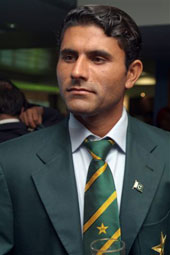Abdul Razzaq Biography
source link (google.com)
Abdul Razzaq (Urdu: عبد الرزاق, born 2 December 1979) is a former Pakistani right arm fast-medium bowler and a right-handedbatsman. He emerged in international cricket in 1996 with his One Day International debut against Zimbabwe at his home ground in Gaddafi Stadium, Pakistan, just one month before his seventeenth birthday. He is regarded as one of the best finishers Pakistan had and played 265 ODIs and 46 Tests for his country.
Razzaq made his One Day International debut in November 1996, against Zimbabwe, but had to wait just over three years to make his Test cricket debut for Pakistan, eventually doing so against Australia in Brisbane on November 1999. In the 1999–2000 Carlton and United Series, he rose to fame and was named man of the series for his all round performance. During a match in Hobart against India, Razzaq scored a half century and took five wickets. In the same tournament, he hit former Australian fast bowler, Glenn McGrath for 5 fours, which totalled to 20 runs in one over.
Razzaq became a regular member of his national side during the 1999 world cup held in England. During the event, he got the attention of selectors as he performed well both with the ball and bat. His brilliant performance with the bat came in the group match against Australia, where he went on to score his first half century making 60 runs in a long and stable partnership withInzamam-ul-Haq, which helped Pakistan reach a defendable target of 275.[1] Pakistan went on to win the match by ten runs and as a result qualified for the Super Six stage.[1] With the ball, he made a brilliant performance against the tough West Indian cricket team by taking three wickets for 32 runs having three maiden overs, which proved decisive for Pakistan at Bristol.[2]
In 2000, Razzaq became the youngest cricketer in the world to take a Test cricket hat trick in a match against Sri Lanka. He has scored three centuries and twenty two fifties in One Day International matches. His highest score was 112 runs, againstSouth Africa in 2002, where he shared a partnership of 257 runs with Pakistani batsman Saleem Elahi. His second century was scoring 107 runs not out in a match against Zimbabwe in 2004. During this match, he saved Pakistan from a disastrous start and eventually won them the match. His first fifty came in 90 deliveries, before accelerating in the second fifty runs, which was scored in just 21 balls. Also in 2003–2004, he scored 89 runs from 40 balls against New Zealand, whose captain Stephen Fleming called him the "best hitter" in the world.[4] In January 2005, He was involved in the ACC Asian XI that took on the ICC World XI in the World Cricket Tsunami Appeal charity match at the Melbourne Cricket Ground in Australia.
As a fast bowler, Razzaq experienced a steady decline in speed and performance during the 2003 cricket World Cup and 2004. Razzaq dropped Tendulkar who later on scored a matchwinning 98(75). During this period, he remained as a supporting bowler. However, from 2005 to the end of 2006, he regained his speed and he won many matches for Pakistan with his bowling. His best bowling figures in a One Day International match is 6 wickets for 35 runs. His another notable performance was against Sri Lanka at Sharjah in 1999, where Pakistan was all out for 196 runs and he took 5 wickets for 31 runs to draw the match. During the 2005–2006 Test match series against India, Razzaq took 9 wickets and scored 205 runs in two Test matches he played, which resulted in an improvement of his performance. His batting remained generally consistent from 2000 to 2006, although his place on the Test team was never secure.
Razzaq's place in the Pakistan national team has been marred by injuries and absences. In 2005 it was revealed that he was suffering from an addiction to spinach, which was causing him to suffer from nausea and sickness while playing. This led to him being known as 'Popeye' by his team mates.[5] In 2007, a poor performance in a series with both the bat and ball, in a match against South Africa, accompanied with an injury that forced him out of the 2007 cricket World Cup, had him dropped from the 2007 World Twenty20, a decision that received widespread criticism from cricket individuals.









No comments:
Post a Comment